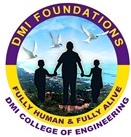About the Department
The Department of Artificial Intelligence and Data Science was started in the academic year 2021-22 with an intake of 60 students. It has State-of-Art Infrastructure and well qualified, experienced and dedicated faculty team. The students are actively involved in Academic and Extra Curricular activities throughout the year.
Vision of the department
To become competitive by developing competent professionals in artificial intelligence through education and research.
Mission of the department
- DM 1: To cultivate individuals with a strong sense of social responsibility who will become leaders in
prominent industries or enter into entrepreneurship on a solid ethical foundation.. - DM 2:To Educate and innovative students for Digital transformation with enhancing AI tools in
collaborative areas.
PEO 1: Core Competency with Employability Skills:
Fundamental knowledge, to analyze, design and implement electronic circuits and systems in Electronics and Communication Engineering by applying knowledge of mathematics and science or in closely related fields with employability skills.
PEO 2: Promote Higher Education and R &D:
To develop the ability to demonstrate technical competence and innovation that initiates interest for higher studies and research.
PEO 3: Inculcating Entrepreneurial Skills:
Entrepreneurs in multidisciplinary domain by adapting to the latest trends in technology catering the social needs.
PEO 4:Ethical Values:
To develop the graduates to attain professional excellence with ethical attitude, communication skills, team work and develop solutions to the problems and exercise their capabilities.
Apply the knowledge of mathematics, science, engineering fundamentals and an engineering specialization to the solution of complex engineering problems.
PO b. Problem Analysis:
Identify, formulate, review research literature, and analyze complex engineering problems reaching substantiated conclusions using first principles of mathematics, natural sciences, and engineering sciences.
PO c Design/Development of Solutions:
Design solutions for complex engineering problems and design system components or processes that meet the specified needs with appropriate consideration for the public health and safety, and the cultural, societal, and environmental considerations.
PO d. Conduct Investigations of Complex Problems:
Use research-based knowledge and research methods including design of experiments, analysis and interpretation of data, and synthesis of the information to provide valid conclusions.
PO e. Modern Tool Usage:
Create, select, and apply appropriate techniques, resources, and modern engineering and IT tools including prediction and modeling to complex engineering activities with an understanding of the limitations.
PO f. Engineer and Society:
Apply reasoning informed by the contextual knowledge to assess societal, health, safety, legal and cultural issues and the consequent responsibilities relevant to the professional engineering practice.
PO g. Environment and Sustainability:
Understand the impact of the professional engineering solutions in societal and environmental contexts, and demonstrate the knowledge of, and need for sustainable development.
PO h. Ethics:
Apply ethical principles and commit to professional ethics and responsibilities and norms of the engineering practice.
PO i. Individual and Team Work:
Function effectively as an individual and as a member or leader in diverse teams, and in multidisciplinary settings.
PO j. Communication:
Communicate effectively on complex engineering activities with the engineering community and with society at large, such as, being able to comprehend and write effective reports and design documentation, make effective presentations, and give and receive clear instructions.
PO k. Project Management and Finance:
Demonstrate knowledge and understanding of the engineering management principles and apply these to one’s own work, as a member and leader in a team, to manage projects and in multidisciplinary environments.
PO l. Life-Long Learning:
Recognize the need for and have the preparation and ability to engage in independent and lifelong learning in the broadest context of technological change.
PSO 1: Student will be able to understand network communication using the layered concept, Open System Interconnect (OSI) and the Internet Model.
PSO 2:Student will be able to understand various types of transmission media, network devices; and parameters of evaluation of performance for each media and device.
PSO 3: Student shall understand the functions performed by a Network Management System and to analyze connection establishment and congestion control with respect to TCP Protocol.
PSO 4:Student shall understand and analyze data encryption standard. such as Diffie-Hellman Key Exchange, ElGamal Cryptosystem, etc. Protocols.
PSO 5:Student shall able to understand to protects the machine and peripheral hardware from theft and from electronic intrusion and damage.
| Sl.No. | Subject Code | Subject Name | Question Bank |
|---|---|---|---|
| 1 | AD3351 | Design and Analysis of algorithm | Click Here |
| 2 | MA3354 | Discrete Mathematis | Click Here |
| 3 | CS3351 | DIGITAL-PRINCIPLES-AND-COMPUTER-ORGANIZATION | Click Here |
| 4 | AL3391 | Artificial Intellegence | Click Here |


